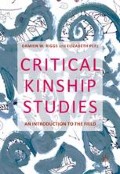Abstract
This chapter provides an overview of some of the core tenets of the field of kinship studies, drawing predominantly on anthropological studies. The introduction also defines critical kinship studies, and provides an overview of the chapter topics in the rest of the book.
Access this chapter
Tax calculation will be finalised at checkout
Purchases are for personal use only
References
Butler, J. (2000). Antigone’s claim: Kinship between life and death. New York: Columbia University Press.
Carsten, J. (2004). After Kinship. Cambridge: Cambridge University Press.
Crenshaw, K. (1989). Demarginalizing the intersection of race and sex: A Black feminist critique of antidiscrimination doctrine, feminist theory and antiracist politics. University of Chicago Legal Forum, 1, Article 8.
Crenshaw, K. (1991). Mapping the margins: Intersectionality, identity politics, and violence against women of color. Stanford Law Review, 6, 1241–1299.
De Haan, L., & Nijland, S. (2002). King & King. Berkeley: Tricycle Press.
De Haan, L., & Nijland, S. (2004). King & King & family. Berkeley/Toronto: Tricycle Press.
Fox, M. (2004). Re-thinking kinship: Law’s construction of the animal body. Current Legal Problems, 57, 469–93.
Fox, M. (2010). Taking dogs seriously? Law, Culture and the Humanities, 6(1), 37–55.
Franklin, S. (1997). Embodied progress: A cultural account of assisted conception. Abingdon: Routledge.
Haraway, D. J. (1989). Primate visions: Gender, race, and nature in the world of modern science. New York: Routledge.
Haraway, D. J. (1991). Simians, cyborgs, and women. New York: Routledge.
Haraway, D. J. (2008). When species meet. Minneapolis: University of Minnesota Press.
Kroløkke, C., Adrian, S., Myong, L., & Tjørnhøj-Thomsen, T. (Eds.). (2015). Critical kinship studies: Kinship (trans)formed. Maryland: Rowman & Littlefield.
Nordqvist, P., & Smart, C. (2014). Relative strangers: Family life, genes and donor conception. Hampshire: Palgrave.
Puar, J. (2013). ‘I would rather be a cyborg than a goddess’: Intersectionality, assemblage, and affective politics. Meritum, revista de Direito da Universidade FUMEC, 8(2).
Riggs, D. W. (2011). Let’s go to the movies: Filmic representations of gay foster and adoptive parents. Journal of GLBT Family Studies, 7, 297–312.
Rubin, G. (1975). The traffic in women: Notes on the ‘political economy’ of sex. In R. R. Reiter (Ed.), Toward an anthropology of women (pp. 157–210). New York: Monthly Review Press.
Schneider, D. M. (1968). American kinship: A cultural account. Chicago: University of Chicago Press.
Schneider, D. M. (1984). A critique of the study of kinship. Ann Arbor: University of Michigan Press.
Strathern, M. (1992a). Reproducing the future: Anthropology, kinship, and the new reproductive technologies. Manchester: Manchester University Press.
Strathern, M. (1992b). After nature: English kinship in the late twentieth century. Cambridge: Cambridge University Press.
Taylor, N. (2012). Animals, mess, method: Post-humanism, sociology and animal studies. In L. Birke & J. Hockenhull (Eds.), Crossing boundaries: Investigating human-animal relationship (pp. 37–50). Boston: Brill.
Twine, R. (2010). Genomic natures read through posthumanisms. The Sociological Review, 58, 175–195.
Wachsberger, K. (2006). Banned books (pp. 198–201; 314; 321). Infobase Publishing.
Wolfe, C. (2010). What is posthumanism? Minneapolis: University of Minnesota Press.
Author information
Authors and Affiliations
Copyright information
© 2016 The Author(s)
About this chapter
Cite this chapter
Riggs, D.W., Peel, E. (2016). Introduction. In: Critical Kinship Studies. Palgrave Macmillan, London. https://doi.org/10.1057/978-1-137-50505-7_1
Download citation
DOI: https://doi.org/10.1057/978-1-137-50505-7_1
Published:
Publisher Name: Palgrave Macmillan, London
Print ISBN: 978-1-137-50504-0
Online ISBN: 978-1-137-50505-7
eBook Packages: Behavioral Science and PsychologyBehavioral Science and Psychology (R0)

